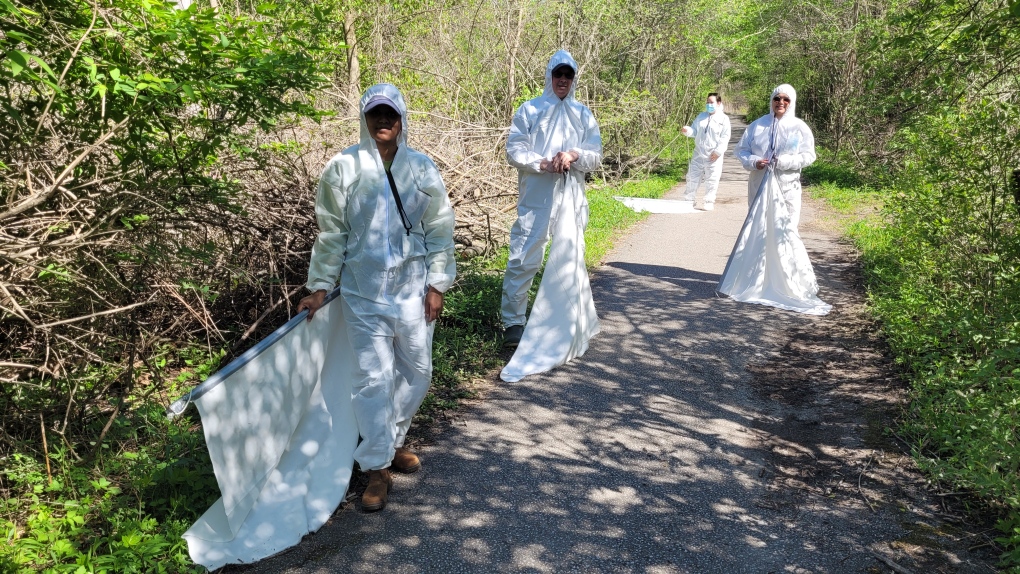WECHU launches active tick surveillance program
The Windsor-Essex County Health Unit has launched its active tick surveillance program.
The program kicked off on Friday. It involves the identification and testing of ticks that are collected by public health staff. The field surveillance is conducted at public parks and trails that are frequently used by residents to retrieve local data of tick populations.
“Lyme disease is a serious disease that is spread by the bite of infected blacklegged ticks. These tiny little creatures can be found in wooded areas such as campgrounds, parks, trails and even in your own backyard”, says Dr. Shanker Nesathurai, acting medical officer of health. "By taking simple precautions, residents can reduce the risk of being bitten by a tick.”
 Public health inspector Joel Barrington shows off the flannel-like material that is draped over the grass to capture ticks in Windsor, Ont. on Friday, May 13, 2022. (Sanjay Maru/CTV Windsor)
Public health inspector Joel Barrington shows off the flannel-like material that is draped over the grass to capture ticks in Windsor, Ont. on Friday, May 13, 2022. (Sanjay Maru/CTV Windsor)
Some tips from WECHU:
- Avoid walking in tall grass and stay on the centre of paths.
- Cover up. Wear long- sleeved shirts and pants.
- Wear light coloured clothing to spot ticks easily.
- Tuck your pants into your socks and wear closed toed shoes.
- Do a full body check on yourself, children and pets after being outdoors.
- Shower within 2 hours of being outdoors.
- Put your clothes into a dryer on high heat (at least 60 minutes) to kill any possible ticks
- Put a tick collar on your pets.
- Keep grass in your yard short.
- If you find a tick on your body, quickly remove the tick with a tick key or a pair of tweezers. Gently wash the bite and surrounding area with soap and water or rubbing alcohol.
If you are concerned about the possibility of Lyme Disease, please follow the steps below:
- Do not dispose of the tick.
- Keep it in a container or a small plastic bag that can be sealed.
- Place a piece of damp paper towel in the container or the bag.
- Contact your health care provider and discuss if any further action is required.
The health unit no longer accepts ticks for identification and testing. You can submit a photograph of the tick to etick.ca, a free online service for identification.
For background information including statistics, visit the health unit’s Ticks and Lyme disease web page.
CTVNews.ca Top Stories

'Anything to win': Trudeau says as Poilievre defends meeting protesters
Prime Minister Justin Trudeau is accusing Conservative Leader Pierre Poilievre of welcoming 'the support of conspiracy theorists and extremists,' after the Conservative leader was photographed meeting with protesters, which his office has defended.
What is changing about Canada's capital gains tax and how does it impact me?
The federal government's proposed change to capital gains taxation is expected to increase taxes on investments and mainly affect wealthy Canadians and businesses. Here's what you need to know about the move.
'My stomach dropped': Winnipeg man speaks out after being criminally harassed following single online date
A Winnipeg man said a single date gone wrong led to years of criminal harassment, false arrests, stress and depression.
Bank of Canada officials split on when to start cutting interest rates
Members of the Bank of Canada's governing council were split on how long the central bank should wait before it starts cutting interest rates when they met earlier this month.
Pilot reported fire onboard plane carrying fuel, attempted to return to Fairbanks just before crash
One of the two pilots aboard an airplane carrying fuel reported there was a fire on the airplane shortly before it crashed and burned outside Fairbanks, killing both people on board, a federal aviation official said Wednesday.
'One of the single most terrifying things ever': Ontario couple among passengers on sinking tour boat in Dominican Republic
A Toronto couple are speaking out about their 'extremely dangerous' experience on board a sinking tour boat in the Dominican Republic last week.
Quebec nurse had to clean up after husband's death in Montreal hospital
On a night she should have been mourning, a nurse from Quebec's Laurentians region says she was forced to clean up her husband after he died at a hospital in Montreal.
7 surveillance videos linked to extortions of South Asian home builders in Edmonton released
The Edmonton Police Service has released a number of surveillance videos related to a series of extortion cases in the city now dubbed 'Project Gaslight.'
Ukraine uses long-range missiles secretly provided by U.S. to hit Russian-held areas, officials say
Ukraine for the first time has begun using long-range ballistic missiles provided secretly by the United States, bombing a Russian military airfield in Crimea last week and Russian forces in another occupied area overnight, American officials said Wednesday.































